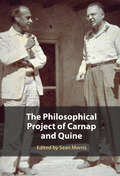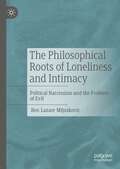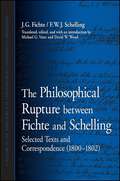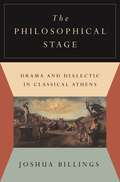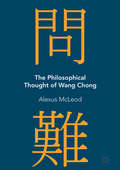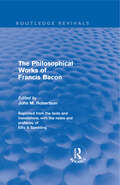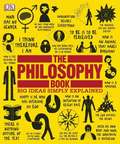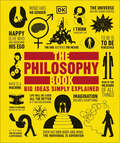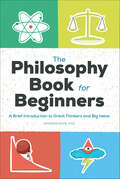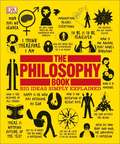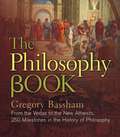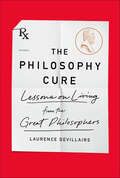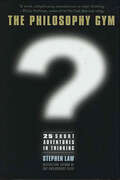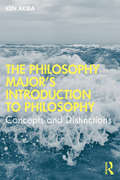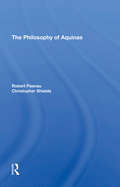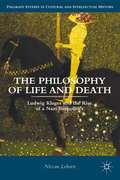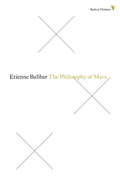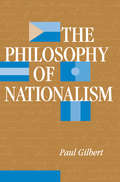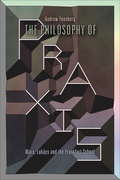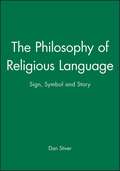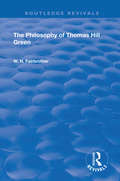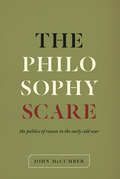- Table View
- List View
The Philosophical Project of Carnap and Quine
by Sean MorrisRudolf Carnap (1891–1970) and W. V. O Quine (1908–2000) have long been seen as key figures of analytic philosophy who are opposed to each other, due in no small part to their famed debate over the analytic/synthetic distinction. This volume of new essays assembles for the first time a number of scholars of the history of analytic philosophy who see Carnap and Quine as figures largely sympathetic to each other in their philosophical views. The essays acknowledge the differences which exist, but through their emphasis on Carnap and Quine's shared assumption about how philosophy should be done-that philosophy should be complementary to and continuous with the natural and mathematical sciences-our understanding of how they diverge is also deepened. This volume reshapes our understanding not only of Carnap and Quine, but of the history of analytic philosophy generally.
The Philosophical Roots of Loneliness and Intimacy: Political Narcissism and the Problem of Evil
by Ben Lazare MijuskovicBen Lazare Mijuskovic has spent 40 years researching theories of consciousness in relation to human loneliness, using an interdisciplinary and "history of ideas" approach. In this book, Mijuskovic combines Kant's theory of reflexive self-consciousness with Husserl's transcendent principle of intentionality to describe the distinctive philosophical, psychological, and sociological roots of loneliness and intimacy. He argues that loneliness is innate, unavoidable, and constituted by the structure of self-consciousness itself.
The Philosophical Rupture between Fichte and Schelling: Selected Texts and Correspondence (1800-1802) (SUNY series in Contemporary Continental Philosophy)
by J. G. Fichte F. W. SchellingThe disputes of philosophers provide a place to view their positions and arguments in a tightly focused way, and also in a manner that is infused with human temperaments and passions. Fichte and Schelling had been perceived as "partners" in the cause of Criticism or transcendental idealism since 1794, but upon Fichte's departure from Jena in 1799, each began to perceive a drift in their fundamental interests and allegiances. Schelling's philosophy of nature seemed to move him toward a realistic philosophy, while Fichte's interests in the origin of personal consciousness, intersubjectivity, and the ultimate determination of the agent's moral will moved him to explore what he called "faith" in one popular text, or a theory of an intelligible world. This volume brings together the letters the two philosophers exchanged between 1800 and 1802 and the texts that each penned with the other in mind.
The Philosophical Stage: Drama and Dialectic in Classical Athens
by Joshua BillingsA bold new reconception of ancient Greek drama as a mode of philosophical thinkingThe Philosophical Stage offers an innovative approach to ancient Greek literature and thought that places drama at the heart of intellectual history. Drawing on evidence from tragedy and comedy, Joshua Billings shines new light on the development of early Greek philosophy, arguing that drama is our best source for understanding the intellectual culture of classical Athens.In this incisive book, Billings recasts classical Greek intellectual history as a conversation across discourses and demonstrates the significance of dramatic reflections on widely shared theoretical questions. He argues that neither "literature" nor "philosophy" was a defined category in the fifth century BCE, and develops a method of reading dramatic form as a structured investigation of issues at the heart of the emerging discipline of philosophy.A breathtaking work of intellectual history by one of today&’s most original classical scholars, The Philosophical Stage presents a novel approach to ancient drama and sets a path for a renewed understanding of early Greek thought.
The Philosophical Thought of Wang Chong
by Alexus McLeodThis book is a study of the methodological, metaphysical, and epistemological work of the Eastern Han Dynasty period scholar Wang Chong. It presents Wang’s philosophical thought as a unique and syncretic culmination of a number of ideas developed in earlier Han and Warring States philosophy. Wang’s philosophical methodology and his theories of truth, knowledge, and will and determinism offer solutions to a number of problems in the early Chinese tradition. His views also have much to offer contemporary philosophy, suggesting new ways of thinking about familiar problems. While Wang is best known as a critic and skeptic, Alexus McLeod argues that these aspects of his thought form only a part of a larger positive project, aimed at discerning truth in a variety of senses.
The Philosophical Works of Francis Bacon (Routledge Revivals)
by John M. RobertsonFirst published in 1905, this reissued edition of The Philosophical Works of Francis Bacon is an edited collection based upon the definitive seven volume edition of 1857, translated and prefaced by Robert Leslie Ellis and James Spedding. Of great historical, philosophical and scientific interest, this collection brings together translations of Bacon’s most important works, including the Novum Organum, the De Augmentis Scientarium, the Parasceve, and the De Principiis atque Originibus, as well as works originally written in English, such as the Valerius Terminus and the Filum Labyrinthi. The reissue offers a comprehensive and provocative collection of the key writings of the man we now consider to be the father of Empiricism who popularised inductive methodologies for scientific inquiry. All works include prefaces by Robert Leslie Ellis and James Spedding, and the collection includes an introductory note from the editor John M. Robertson.
The Philosophical Writings of Descartes: Volume I
by John Cottingham Robert Stoothoff Dugald Murdoch Rene DescartesThese two 1985 volumes provide a translation of the philosophical works of Descartes, based on the best available Latin and French texts. They are intended to replace the only reasonably comprehensive selection of his works in English, by Haldane and Ross, first published in 1911. All the works included in that edition are translated here, together with a number of additional texts crucial for an understanding of Cartesian philosophy, including important material from Descartes' scientific writings. The result should meet the widespread demand for an accurate and authoritative edition of Descartes' philosophical writings in clear and readable modern English.
The Philosophical Writings of Descartes: Volume II
by John Cottingham Robert Stoothoff Dugald Murdoch Rene DescartesThese two volumes provide a translation of the philosophical works of Descartes, based on the best available Latin and French texts. They are intended to replace the only reasonably comprehensive selection of his works in English, by Haldane and Ross, first published in 1911. All the works included in that edition are translated here, together with a number of additional texts crucial for an understanding of Cartesian philosophy, including important material from Descartes' scientific writings. The result should meet the widespread demand for an accurate and authoritative edition of Descartes' philosophical writings in clear and readable modern English.
The Philosophical Writings of Descartes: Volume III
by John Cottingham Robert Stoothoff Dugald Murdoch Rene Descartes Anthony KennyVolumes I and II provided a completely new translation of the philosophical works of Descartes, based on the best available Latin and French texts. Volume III contains 207 of Descartes' letters, over half of which have previously not been translated into English. It incorporates, in its entirety, Anthony Kenny's celebrated translation of selected philosophical letters, first published in 1970. In conjunction with Volumes I and II it is designed to meet the widespread demand for a comprehensive, authoritative and accurate edition of Descartes' philosophical writings in clear and readable modern English.
The Philosophy Book (Big Ideas Simply Explained)
by Dorling Kindersley Publishing StaffTo the complete novice, learning about philosophy can be a cause for dread. "The Philosophy Book" uses innovative graphics and creative typography to help demystify hard-to-grasp concepts for those new to philosophy, cutting through the haze of misunderstanding, untangling knotty theories, and shedding light on abstract concepts. Aimed at anyone with a general interest in how our social, political, and ethical ideas are formed, as well as students of philosophy and politics, "The Philosophy Book" breathes new life to a subject that is often regarded as esoteric and academic.
The Philosophy Book (DK Big Ideas)
by DKGet to grips with the concepts that shaped the way we think about ethics, politics, and our place in the universe.Explaining the big ideas and groundbreaking theories of key philosophers clearly and simply, The Philosophy Book is the perfect one-stop guide to philosophy and the history of how we think. Untangling knotty theories and shedding light on abstract concepts, entries explore and explain each complex idea with easy-to-follow explanations and innovative visuals. Explore the history of philosophy, from ancient Greece and China to today, and find out how theories from over 2,000 years ago are still relevant to our modern lives. Follow the progression of human ideas and meet the world's most influential philosophers – from Plato and Confucius through René Descartes and Mary Wollstonecraft to Ludwig Wittgenstein and Judith Butler.Dive into this phenomenal philosophy book to discover:-An accessible guide to philosophy, covering every major school and movement throughout history.-The clear and detailed text explains the most groundbreaking philosophical concepts and theories ever devised, while bold illustrations and pull-out quotes bring each idea to life.-Fully revised and updated to cover any developments in the field over the last 5–10 years.-Biography and context boxes place each idea in its wider historical, cultural, and social context.Your Philosophical Questions, Simply ExplainedIf you thought it was difficult to learn philosophy and its many concepts, The Philosophy Book presents the key ideas in a clear layout. Find out what philosophers thought about the nature of reality and the fundamental questions we ask ourselves: What is the meaning of life? What is the Universe made of? And work your way through the different branches of philosophy, such as metaphysics and ethics, from ancient and modern thinkers.The Big Ideas SeriesWith millions of copies sold worldwide, The Philosophy Book is part of the award-winning Big Ideas series from DK. The series uses striking visuals and engaging writing, making big topics easy to understand.
The Philosophy Book for Beginners: A Brief Introduction to Great Thinkers and Big Ideas
by Sharon KayeExplore big questions and understand complex philosophyWho are you? What is truly real? Is there such a thing as free will? If you have ever considered questions like these, that's philosophy. The Philosophy Book for Beginners breaks down the core concepts of both Eastern and Western philosophy in clear language that explains the most important people and ideas. You'll develop an understanding of the basic ideas and see your understanding of the world expand—no dense, academic texts required.The major branches—Explore the central questions of metaphysics, epistemology, logic, and axiology as you see how they changed over time.A wide range of thinkers—Discover the diverse perspectives of philosophers, from Socrates in the fifth century BCE to modern-day thinkers like Martha Nussbaum.Thought experiments—Each chapter focuses on a topic, like existentialism, stoicism, or radical faith, and ends with a related thought experiment for you to ponder.Gain a solid understanding of philosophy, with a book that makes it easy to grasp and relevant to the world today.
The Philosophy Book: Big Ideas Simply Explained (Big Ideas Ser.)
by DkThe Philosophy Book answers the most profound questions we all have. It is your visual guide to the fundamental nature of existence, society, and how we think. Discover what it means to be free, whether science can predict the future, or how language shapes our thoughts. Learn about the world's greatest philosophers, from Plato and Confucius to modern thinkers such as Chomsky and Derrida and follow charts and timelines that graphically show the progression of ideas and logic. Written in plain English, with concise explanations of branches of philosophy such as metaphysics and ethics, it untangles complicated theories and makes sense of abstract concepts. It is an ideal reference whether you're a student or a general reader, with simple explanations of big ideas, including the four noble truths, the soul, class struggle, moral purpose, and good and evil. If you're curious about the deeper questions in life, The Philosophy Book is both an invaluable reference and illuminating read. Series Overview: Big Ideas Simply Explained series uses creative design and innovative graphics, along with straightforward and engaging writing, to make complex subjects easier to understand. These award-winning books provide just the information needed for students, families, or anyone interested in concise, thought-provoking refreshers on a single subject.
The Philosophy Book: From the Vedas to the New Atheists, 250 Milestones in the History of Philosophy (Union Square & Co. Milestones)
by Gregory BasshamPhilosophy explores the deepest, most fundamental questions of reality—and this accessible and entertaining chronology presents 250 milestones of the most important theories, events, and seminal publications in the field over the last 3,500 years. The brief, engaging entries cover a range of topics and cultures, from the Hindu Vedas and Plato&’s theory of forms to Ockham&’s Razor, Pascal&’s Wager, Hume&’s A Treatise of Human Nature, existentialism, feminism, Philosophical Zombies, and the Triple Theory of Ethics. Beautifully illustrated and filled with unexpected insights, The Philosophy Book will appeal to a wide spectrum of readers.
The Philosophy Cure: Lessons on Living from the Great Philosophers
by Laurence DevillairsThe wisdom of famous philosophers distilled into practical takeaways for readers who seek to confront reality and carve out a livable space within it.For centuries, philosophers have considered the “big questions” of human life, mulling over everything from ethics to the definition of reality. Their ideas and insights are powerful and innovative, but often inaccessible and far too academic for most readers. In The Philosophy Cure: Lessons on Living from the Great Philosophers, scholar and expert on Cartesian philosophy, Laurence Devillairs has stripped away the convoluted language, translating the core ideas and wisdom of some of the most prominent philosophers into simple concepts for modern readers. She skillfully reveals that far from being impractical or distantly academic, philosophy is, at its heart, a deeply useful discipline ultimately concerned with what it means to live a good and fulfilling life.Perfect for readers who are intrigued with philosophy, but who are uninterested in reading dense academic texts, The Philosophy Cure reveals the true wisdom of the best-known philosophers—from Socrates to Kant and Descartes.
The Philosophy Gym: 25 Short Adventures in Thinking
by Stephen LawFrom Descartes to designer babies, The Philosophy Gym poses questions about some of history's most important philosophical issues, ranging in difficulty from pretty easy to very challenging. He brings new perspectives to age-old conundrums while also tackling modern-day dilemmas -- some for the first time. Begin your warm up by contemplating whether a pickled sheep can truly be considered art, or dive right in and tackle the existence of God. In this radically new way of looking at philosophy, Stephen Law illustrates the problem with a story, then lets the argument battle it out in clear, easily digestible and intelligent prose. This perfect little mental health club is sure to give each reader's mind a great workout.
The Philosophy Major’s Introduction to Philosophy: Concepts and Distinctions
by Ken AkibaMany philosophy majors are shocked by the gap between the relative ease of lower-level philosophy courses and the difficulty of upper-division courses. This book serves as a necessary bridge to upper-level study in philosophy by offering rigorous but concise and accessible accounts of basic concepts and distinctions that are used throughout the discipline. It serves as a valuable advanced introduction to any undergraduate who is moving into upper-level courses in philosophy. While lower-level introductions to philosophy usually deal with popular topics accessible to the general student (such as contemporary moral issues, free will, and personal identity) in a piecemeal fashion, The Philosophy Major’s Introduction to Philosophy offers coverage of important general philosophical concepts, tools, and devices that may be used for a long time to come in various philosophical areas. The volume is helpfully divided between a focus on the relation between language and the world in the first three chapters and coverage of mental content in the final two chapters, but builds a coherent narrative from start to finish. It also provides ample study questions and helpful signposts throughout, making it a must-have for any student attempting to engage fully with the problems and arguments in philosophy. Key Features Integrates topics from various areas of philosophy, such as philosophy of language, metaphysics, epistemology, ethics, and philosophical logic Provides descriptions of logico-mathematical tools necessary for philosophical studies, such as propositional logic, predicate logic, modal logic, set theory, mereology, and mathematical functions Makes connections with modern philosophy, including discussions of Descartes’s skepticism and dualism, Locke’s theory of personal identity, Hume’s theory of causation, and Kant’s synthetic a priori Includes well-known entertaining puzzles and thought experiments such as the Ship of Theseus, the Statue and the Clay, a Brain in a Vat, and Twin Earth Lists helpful Exercise Questions and Discussion Questions at the end of each chapter and answers selected questions at the back of the book
The Philosophy Of Aquinas
by Robert Pasnau Christopher ShieldsThis book introduces Thomas Aquinas's own principal fascinations in philosophy: rational theology, metaphysics, human nature, philosophy of mind, and value theory. It offers an introduction to his overarching explanatory framework in a distinctive deployment of an approach familiar from Aristotle.
The Philosophy Of Life And Death
by Nitzan LebovicSome of the first figures the Nazis conscripted in their rise to power were rhetoricians devoted to popularizing the German vocabulary of Leben (life). This fascinating study reexamines this movement through one of its most prominent exponents, Ludwig Klages, revealing the philosophical-cultural crises and political volatility of the Weimar era.
The Philosophy Of Marx
by Etienne Balibar Chris TurnerProviding a lucid and accessible introduction to Marx, complete with pedagogical boxes, a chronology and guides to further reading, Etienne Balibar makes the most difficult areas of his philosophy easy to understand. One of the most influential French philosophers to have emerged from the 1960s, Balibar brings a lifetime of study and expertise to create a brilliantly concise portrait of Marx that will initiate the student and intrigue the scholar.He examines all the key areas of Marx's writings, including his early works, The Communist Manifesto, The German Ideology and Capital, explaining their wider historical and theoretical context. Making clear such concepts as class struggle, ideology, humanism, progress, determinism, commodity fetishism and the state, Balibar includes brief yet incisive biographical studies of key Marxists such as Althusser, Gramsci, Engels and Lenin.The Philosophy of Marx will become the standard guide to Marx's thought.
The Philosophy Of Nationalism
by Paul GilbertIn this, the first truly philosophical study of nationalism, Paul Gilbert attempts to make sense of the fact that there are different sorts of nationalism?for example, political and cultural?and that each concept functions with a different understanding of what a nation is. He sets out to explore whether there are any common ideas about what constitutes nationhood and whether these ?nations? have particular rights due to them. By treating nationalism as a coherent body of ideas, the text permits a rational reconstruction of the origins of nationalist movements. The book also examines the work of many key theorists, including Mill, Hume, Gramsci, and Gellner, in its coverage of secession, immigration, cultural rights and multiculturalism, and the aesthetics of nationalism.
The Philosophy Of Praxis
by Andrew FeenbergPhilosophy of Praxis examines the work of four Marxist thinkers, the early Marx and Lukács, and the Frankfurt School philosophers Adorno and Marcuse. The book holds that fundamental philosophical problems are in reality social problems, abstractly conceived. This argument has two implications: on the one hand, philosophical problems are significant insofar as they reflect real social contradictions; on the other hand, philosophy cannot resolve the problems it identifies because only social revolution can eliminate their social causes. Feenberg's Lukacs, Marx and the Sources of Critical Theory was an intellectual history of these discussions. Philosophy of Praxis is an update of that classic theoretical work, which details how the discussion has been taken up by contemporary schools of thought, including Marxist political theory and continental philosophy.
The Philosophy Of Religious Language: Sign, Symbol And Story
by Dan R. StiverThis text provides a lively introduction to the developments in philosophy of language in this century, and to the way these have impinged upon religious language. Included is the relevance of analytical philosophy of language, but the text also covers important historical debates about religious language that have had increasing impact upon biblical studies and theology.
The Philosophy Of Thomas Hill Green (Routledge Revivals)
by W.H. FairbrotherPublished in 1900, this is a collection of one of Britain’s most prolific metaphysic thinkers of the 19th century. Fairbrother introduces Thomas Hill Greens moral philosophy on themes such as politics and virtue whilst relating it back to the philosophy of ancient Greece that first inspired Green.
The Philosophy Scare: The Politics of Reason in the Early Cold War
by John MccumberFrom the rise of formalist novels that championed the heroism of the individual to the proliferation of abstract art as a counter to socialist realism, the years of the Cold War had a profound impact on American intellectual life. As John McCumber shows in this fascinating account, philosophy, too, was hit hard by the Red Scare. Detailing the immense political pressures that reshaped philosophy departments in midcentury America, he shows just how radically politics can alter the course of intellectual history. McCumber begins with the story of Max Otto, whose appointment to the UCLA Philosophy Department in 1947 was met with widespread protest charging him as an atheist. Drawing on Otto's case, McCumber details the hugely successful conservative efforts that, by 1960, had all but banished the existentialist and pragmatist paradigms--not to mention Marxism--from philosophy departments all across the country, replacing them with an approach that valorized scientific objectivity and free markets and which downplayed the anti-theistic implications of modern thought. As he shows, while there have since been many instances of definitive and even explosive rejection of this conservative trend, its effects can still be seen at American universities today.
